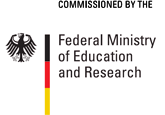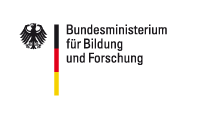30. August 2015
1 Funding purpose and legal basis
1.1 Funding purpose
Based on the agreements reached in the German-Palestinian Steering Committee meetings at ministerial and working level which have taken place since 2010, the Federal Ministry of Education and Research (BMBF) and the Palestinian Ministry of Education and Higher Education (MoEHE) hosted a joint workshop in 2011 in Ramallah to promote and expand bilateral cooperation in science and research and to define effective instruments for strengthening the joint activities of German and Palestinian researchers.
This first joint German-Palestinian announcement aims at intensifying the German-Palestinian cooperation in the field of science and research.
The announcement is based on the Memorandum of Understanding (MoU) on Cooperation in Education, Science and Research between the Federal Ministry of Education and Research of the Federal Republic of Germany and the Palestine Liberation Organization for the benefit of the Palestinian Authority of 19 March 2014.
Both sides intend to attach particular importance to supporting joint research activities of young scientists.
1.2 Legal basis
On the German side:
The Federal Government will award grants in accordance with these funding regulations, sections 23 and 44 of the Federal Budget Code (BHO) and the administrative regulations adopted there under as well as the BMBF's regulations governing applications for expenditure-based grants (AZA) and/or cost-based grants (AZK). There is no legal entitlement to a grant. The funding authority will take a decision after due assessment of the circumstances and within the framework of the budget funds available.
The awarding of grants to companies is governed by the provisions of Commission Regulation (EU) No 1407/2013 of 18 December 2013 on the application of Articles 107 and 108 of the Treaty on the Functioning of the European Union to de minimis aid (Official Journal of the EU L 352 p.1 etseqq of 24 December 2013) as amended. De minimis aid must not exceed €200,000 (or €100,000 in road freight transport) over any period of three fiscal years. The notification of award will include a de minimis statement. This statement must be:
- Kept for ten years;
- Produced at the request of the European Commission, a federal or Land authority or the funding authority within one week or a longer period specified in the request. Should the statement not be produced within this period, the Federal Ministry of Education and Research reserves the right to revoke the award and reclaim the funds awarded;
- Submitted with any future application for de minimis aid as evidence of de minimis aid already granted.
2 Object of funding
The aim of this announcement is to develop and deepen bilateral scientific cooperation between German and Palestinian research institutions, universities and innovative enterprises in the field of science and research. Thus, the announcement aims at supporting cooperation between Germany and the Palestinian autonomy in the fields of scientific research and technological development through funding
a. Joint German-Palestinian application-oriented research projects
b. Mobility projects for the establishment of joint research partnerships
Furthermore, support will be provided for the preparation of new project applications within the Research Framework Programme of the European Union.
Based on the bilateral agreements reached within the framework of the meetings of the German-Palestinian Steering Committee and the joint workshop in Ramallah, the two sides will accept submissions of research proposals in the following priority areas of joint interest:
- Nanotechnology/Material Sciences
- Agricultural Science/ Natural Resources Management
- Renewable Energy
In addition, project proposals should incorporate the following components respectively cross-cutting issues (not compulsory):
- IT Management
- Application-oriented apprenticeship/training
- Communication and Networking
Special emphasis is put on cooperation between different partners in the area of Research and Development (R&D), their scientific qualifications, and the participation of industry partners.
3. Funding recipients
German and Palestinian universities non-university research institutions and centres and other institutions including university hospitals contributing to research as well as commercial companies headquartered in Germany and/or in the Palestinian Territories - particularly small and medium-sized enterprises (SMEs), located in Germany and/or in the Palestinian Territories, are eligible for funding.*
On the German side:
Research institutions that receive joint basic funding from the Federal Government and the Länder can only be granted project funding supplementary to their basic funding to cover additional project-related expenditure under certain preconditions.
4. Funding prerequisites
The German-Palestinian project consortia should – to the extent possible – include higher education institutions, universities, research institutions as well as the companies or public bodies involved in utilizing the results of the applied research.
The project outline is to be submitted by the applicant on the German side together with at least one cooperation partner from the Palestinian Territories. Further partners may participate in the research project provided this constitutes an advantage for the project and said partners contribute their own funding.
Securing institutional or other third-party funding for project activities at home and abroad is a basic prerequisite.
Projects proposed for funding under this call should document their potential for longer-term sustainable cooperation in the Palestinian Territories.
5 Type, scope and rates of funding
For the German side:
Funds can be granted through project funding as non-repayable subsidies.
Grants for industrial companies are calculated on the basis of the eligible project-related costs, which are generally financed up to 50% depending on how practically oriented the project is. The BMBF’s policy requires that these companies contribute at least 50% towards the eligible costs incurred.
Grants for universities, research and science institutions and similar establishments are calculated on the basis of the eligible project-related expenditure (grants for Helmholtz centres and the Fraunhofer Gesellschaft (FhG) are calculated on the basis of the eligible project-related costs) that can be individually funded up to 100%.
For the German and the Palestinian side:
The maximum amount of funding applied for in total
- Joint German-Palestinian application-oriented research projects with a maximum funding duration of 24 months should not exceed € 30,000 per project
- Mobility projects for the establishment of joint research partnerships with a maximum funding duration of 24 months should not exceed € 8,000 per project
The following expenditures will be eligible for funding:
- Joint German-Palestinian application-oriented research projects, the expenditures specified under 5.1 to 5.6 will be eligible for funding.
- Mobility projects for the establishment of joint research partnerships, the expenditures specified under 5.1 to 5.3 and 5.6 will be eligible for funding.
Paragraphs 5.1 to 5.5 below apply to the German side only; Paragraph 5.6 applies to the Palestinian side only.
5.1 The following applies to the funding of travel expenses of German project scientists and experts:
Travel expenses including visa (air tickets: economy class) to and from the location of the project partner in the Palestinian Territories.
Daily allowances and project-related domestic travel expenses: as a rule, a fixed lump-sum of €107 per day and/or €2,392 per month (for stays from 23 up to 31 days) will be paid annually for stays of up to 3 months in Palestine under the funding agreement.
These lump sums cover contributions to health insurance and, if applicable, other types of insurance, which must therefore be paid by the grant recipients themselves.
5.2 The following applies to the funding of travel expenses of Palestinian project scientists(by the German side):
Travel expenses (air tickets: economy class) to and from the location of the project partner in Germany.
Daily allowances and project-related domestic travel expenses: as a rule, a fixed lump-sum of €104 per day and/or €2,300 per month (for stays from 23 up to 30 days) will be paid annually for stays of up to 3 months in Germany under the funding agreement by the German side.
These lump sums cover contributions to health insurance and, if applicable, other types of insurance, which must therefore be paid by the grant recipients themselves.
5.3 Equipment
Project-related grants for non-cash resources (such as expendables, appliances, phone and office supplies, transport, literature, rent, orders etc.) can be provided to a limited extent in duly substantiated exceptional cases.
5.4 Workshops:
Workshops with already known partners or workshops aimed at opening up new cooperation potential can be supported in the following ways:
Grants will be provided towards material expenses incurred in the organisation of bilateral workshops in Germany including the accommodation of foreign guests, the transfer within Germany, the preparation of the workshop, entertainment and the rental of the venue. The amount of the grant depends on the size of the workshop and the number of foreign guests. No daily allowances (cf. 4.1) will be paid in such cases.
5.5 International coordination staff
Project-related costs for students, administrative and/or scientific staff are eligible for funding.
Flat-rate grants cannot be awarded to universities and university hospitals.
5.6 On the Palestinian side:
On the Palestinianside for Palestinian project scientists, the following project-related expenditures will be eligible for funding:
- project-related staff costs (only for Joint German-Palestinian application-oriented research projects)
- project-related laboratory equipment and software
- project-related costs for consumables; obligated conference fees and publication costs
The purchase and employment procedures follow according to the related regulations of the beneficent universities ,research institutes or university hospitals.
The total project-related equipment and software on the Palestinian side shall not exceed 25% of the total budget provided for the whole project.
6 Other grant regulations
The Auxiliary Terms and Conditions for Funds provided by the BMBF on a Cost Basis (NKBF98) will be part of the notification of award for grants on a cost basis.
The General Auxiliary Conditions for Grants Provided for Projects on an Expenditure Basis (ANBest-P) and the Special Auxiliary Terms and Conditions for Funds provided by the BMBF for the Promotion of Projects on Expenditure Basis (BNBest-BMBF98) will form part of the notification of award of grants on an expenditure basis.
7 Procedure on the German and Palestinian side
7.1 On the German side
Involvement of the International Bureau (IB) and request for documents
The Federal Ministry of Education and Research (BMBF) has commissioned with processing the funding measures:
Projektträger
im Deutschen Zentrum für Luft- und Raumfahrt e.V. (DLR)
Europäische und Internationale Zusammenarbeit
Heinrich-Konen-Straße 1
53227 Bonn
Internet: http://www.internationales-buero.de
Scientific officer at the International Bureau:
Susanne Ruppert-Elias
E-Mail: Susanne.Ruppert-Elias@dlr.de
Telefon: +49 (0)228 3821 1487
Telefax: +49 (0)228 3821 1490
Administrative contact at the International Bureau:
Silva Luthin-Geier
E-Mail: Silva.Luthin-Geier@dlr.de
Telefon: : +49 (0)228 38 21-1863
Telefax: : +49 (0)228/38 21-1490
On the Palestinian side the Ministry of Education and Higher Education (MoEHE) is responsible.
Scientific contact person on the Palestinian side
Dr. Raed A. Amro/ Assistent Professor
Palestine Polytechnic University/ College of Engineering
E-Mail: raedamro@ppu.edu
Cell Phone: +970 599 098670
Fax: +970 (0)2 2233050
Any changes to the above information will be announced in the Federal Gazette (Bundesanzeiger) or in a comparable suitable medium.
Funding applications forms, guidelines, leaflets, information and auxiliary terms and conditions are available online at https://foerderportal.bund.de/easy/easy_index.php?auswahl=easy_formulare&formularschrank=bmbf or can be obtained directly from the project management organization.
Applicants are advised to contact the project management organizations on both sides to obtain advice on how to apply and for any further information.
7.2 Submission of funding applications and decision-making procedure
The procedure consists of two stages:
7.2.1 Submission of project descriptions
In the first stage, draft proposals are to be submitted in English by 21 December 2015 (23:59 Brussels time) at the latest, using the electronic system PT-Outline (https://secure.pt-dlr.de/ptoutline/palger2015).
Applications received after the deadline will not be considered.
The submission of a project description does not establish a legal entitlement to a grant.
The English draft proposal should be structured as follows:
Part A.) Information for administrative purposes. These data fields are regular components of all calls and are entered in an internet form.
Part B.) An individual, call specific project description, with the following topics:
- Objectives, excellence and originality of the proposal
- Status of science and technology; previous work/research
- Comprehensive description of methodology and work plan
- Benefits and utilization of results
- Previous experiences of cooperation with other partners
- Need for project support
- Financial sheet
- Annexes (CV from the principal Investigator; Publication list etc.)
The project description (Part B) can be uploaded only as a single document in PT-Outline (word or pdf-document).
The draft proposal is matter for the scientific and specific evaluation of the project. The project description should therefore contain comprehensive evidence to all positions of the outline (see structure for project description above). The description should not exceed 10 pages (Arial 11, 1.5 line spacing, 2 cm margin, excluding publication list and other annexes).
A legally binding and signed version of the English draft proposal (a pdf-document of the proposal is created by PT-Outline) is also to be sent by latest 28 December 2015 by the German side to the International Bureau and by the Palestinian side to the Palestinian Ministry of Education and Higher Education:
German side:
Projektträger
im Deutschen Zentrum für Luft- und Raumfahrt e.V. (DLR)
Ms Susanne Ruppert Elias
Europäische und internationale Zusammenarbeit
Heinrich-Konen-Straße 1
53227 Bonn
Palestinian side:
Ministry of Education and Higher Education (MoEHE)
Dr. Anwar Zakarya/ Assistant Deputy for Higher Education
Phone: +970 2 298 2604
E-mail: anwartarifi@yahoo.com
An abstract in German language must be included.
Applicants have no legal claim to the return of their project outlines.
7.2.2 Submission of formal funding applications
In the second stage, applicants whose draft proposals have been evaluated positively will be invited to submit -in coordination with the designated project coordinator- a formal application for funding on which a decision will be taken after a final evaluation.
To draft formal applications for funding, applicants must use the BMBF’s electronic application system “easy”.
Forms for funding applications, guidelines, instructions, information and supplementary provisions can be found under https://foerderportal.bund.de/easy/easy_index.php?auswahl=easy_formulare&formularschrank=bmbf or can be obtained directly from the project management organisation.
It is essential that the formal application includes a project description in German of no more than ten pages and which includes the following:
- Cooperation objectives
- Planned measures to implement the funding targets identified in Nr 2 above
- Added value of international cooperation
- Contributions of international partners, access to international resources
- Cooperation experience, previous collaboration
- Detailed description of the cooperation work plan
- Procedural steps of cooperation project, milestone planning in terms of substance and timing
- Project-related resource planning
- Detailed financial plan in tabular form
- Utilization plan (e.g. consolidation of cooperation with partners in the Palestinian Territories)
- Planned cooperation in follow-up projects
- Planned expansion of cooperation to include other institutions and networks
Received applications for funding will be evaluated by independent and external experts on the German as well as on the Palestinian side. The following criteria will apply for
a. Joint German-Palestinian application-oriented research projects:
- Compliance of the project with content-related focus areas and with formal requirements
- Scientific excellence and originality of the project
- Quality of the planned utilization of the results
- Potential scientific impact
- Prospects for the realization of the aspired objectives
- Quality of cooperation and added value of partner institutions
- Initiating new partnerships and promoting young / female scientists
- Appropriateness and necessity of funding applied for
b. Mobility projects for the establishment of joint research partnerships:
- Compliance of the project with content-related focus areas and with formal requirements
- Quality and originality of the proposal
- Qualification of the applicants
- Utilization of the project results
- Added value of the cooperation
- Appropriateness and necessity of funding applied for
- Funding decisions will be made after a final review of the applications based on the evaluation criteria mentioned above.
A funding decision will be taken following a final review based on the above criteria and evaluations.
Only applications approved by both sides will receive funding. Applicants will be informed in writing about the result of the selection process.
7.3 Relevant regulations
For the German side:
The approval and payment of, and accounting for, the funds as well as proof and examination of proper use and, if necessary, termination of the funding contract and reclaiming of the funds awarded are governed by the administrative regulations pertaining to section 44 of the Federal Budget Code (BHO) and sections 48 to 49a of the Administrative Procedure Act (VwVfG), unless deviation is allowed under the present funding regulations.
8. Entry into force
This announcement will enter into force on the date of publication in the Federal Gazette (Bundesanzeiger).
Bonn, Ramallah, 30.08.2015
Federal Ministry of Education and Research
Peter Webers
Palestinian Ministry of Education and Higher Education
*In accordance with the EU’s definition of SMEs: The category of micro, small and medium-sized enterprises (SMEs) is made up of enterprises which employ fewer than 250 employees and which have an annual turnover not exceeding € 50 million, and/or an annual balance sheet total not exceeding € 43 million. Within this category the following definitions apply: small enterprises are defined as enterprises which employ fewer than 50 persons and whose annual turnover and/or annual balance sheet total does not exceed € 10 million. A micro-enterprise is defined as an enterprise which employs fewer than 10 persons and whose annual turnover and/or annual balance sheet total does not exceed € 2 million. In general, most SMEs are autonomous sine they are either completely independent or have one or more minority partnerships (each less than 25%) with other enterprises, which have one or more minority stakes (see 2.3.1, p. 16). If that holding rises to no more than 50%, the relationship is deemed to be between partner enterprises (see 2.3.2, p.20). Above that ceiling, the enterprises are linked (see 2.3.3, p.23).
Source: http://ec.europa.eu/enterprise/enterprise_policy/sme_definition/sme_user_guide_de.pdf and http://ec.europa.eu/enterprise/policies/sme/facts-figures-analysis/sme-definition/index_en.htm










